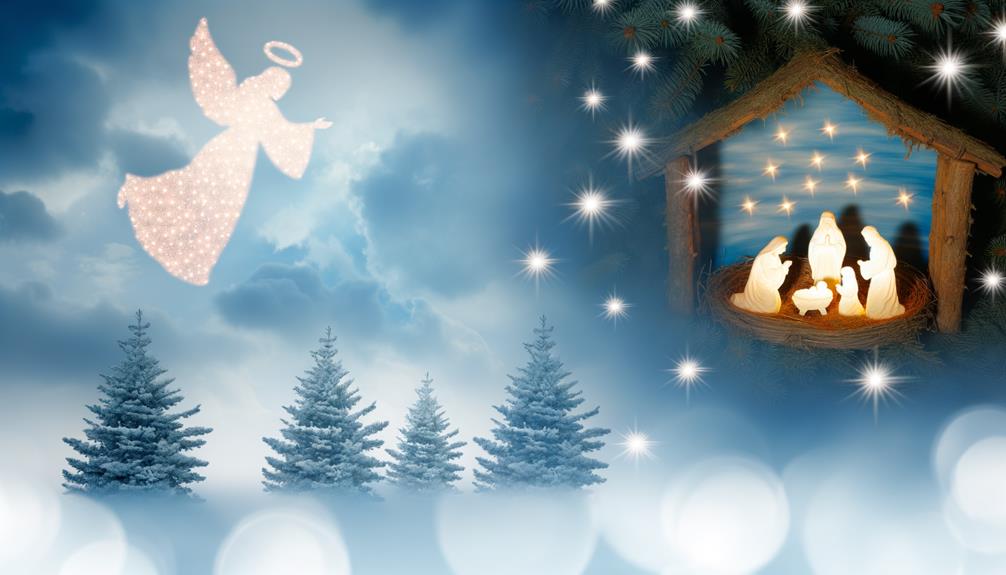Noelle Name Meaning and Origin
Noelle is derived from the Latin term 'natalis' and the French word 'Noël,' reflecting a blend of French and Latin heritage. Historically associated with the celebration of Christmas, the name emerged as the feminine form of Noel.
It gained popularity during the medieval period, symbolizing joy, light, and new beginnings. In modern times, Noelle remains a favored choice in the United States and other Christian societies, known for its melodic sound and elegant simplicity.
Its variations include Noella, Noele, and Noela. The name continues to evoke festive cheer and cultural richness, inviting exploration into its timeless appeal.

Key Takeaways
- The name Noelle originates from the French word 'Noël,' which means Christmas.
- Noelle is the feminine form of Noel, derived from the Latin term 'natalis.'
- It symbolizes joy, light, and new beginnings, reflecting Christian traditions.
- Noelle gained popularity in the United States during the late 20th century.
- Variations include Noella, Noele, and Noela, each with a unique regional touch.
Historical Background
Rooted in the Latin term 'natalis,' meaning 'birth,' the name Noelle has historical significance mainly associated with the celebration of Christmas. This name, commonly used in French-speaking regions, emerged as a feminine form of Noel, which itself means 'Christmas' in French.
Historically, Noelle became popularized during the medieval period, coinciding with the Christian practice of naming children born on Christmas Day or during the festive season after the holiday. Such names were believed to carry a sense of divine blessing and joy. The name's usage spread across Europe and later to other parts of the world, maintaining its connection to the Nativity and Christian traditions.
Today, Noelle remains a poignant reminder of its rich historical and cultural heritage.
Linguistic Roots
The name Noelle originates from the French word 'Noël,' meaning Christmas, and has roots in Latin 'natalis,' signifying birth.
The etymological journey of Noelle reflects its transformation through centuries, influenced by cultural and linguistic shifts.
This name's evolution underscores the blend of French and Latin heritage that has shaped its contemporary usage.
French and Latin Influence
Noelle's etymology can be traced back to the Latin word 'natalis' and the Old French term 'noël,' both signifying birth or Christmas. This dual linguistic heritage underscores the name's deep cultural resonance.
The Latin influence reflects the significance of natalis in early Christian traditions, emphasizing the celebration of Christ's nativity.
Meanwhile, the Old French contribution highlights the medieval European customs surrounding Christmas festivities.
To elaborate on the French and Latin influence:
- Latin 'natalis': Root word meaning birth, central to Christian lexicon.
- Old French 'noël': Adapted into French from Latin, denoting Christmas.
- Medieval Usage: Popularized during the Middle Ages in Christian Europe.
- Cultural Significance: Symbolizes joy and rebirth in both religious and secular contexts.
These elements collectively shape Noelle's rich historical and linguistic background.
Etymological Evolution Over Time
Tracing the etymological evolution of Noelle reveals a fascinating journey through various linguistic phases, reflecting changes in cultural and religious contexts over centuries.
Originating from the Latin term 'natalis' meaning 'birth,' the name evolved as it transformed into Old French as 'Noel,' signifying 'Christmas' or 'born on Christmas Day.'
The feminine form, Noelle, became prevalent in the French-speaking world during the medieval period, aligning with the Christian celebration of the Nativity.
Over time, Noelle maintained its association with birth and festivity, eventually spreading to English-speaking countries.
This progression highlights the name's enduring link to religious symbolism and seasonal celebration, illustrating how linguistic and cultural influences have shaped its usage and meaning across different eras.
Cultural Significance
In various cultures, the name Noelle carries deep historical significance, often associated with the festive spirit of Christmas and embodying themes of joy and celebration. Originating from the Old French word 'noël,' meaning 'Christmas,' Noelle is traditionally given to girls born during the holiday season.
The name reflects the widespread influence of Christianity and its traditions. The cultural significance of Noelle can be delineated as follows:
- Christian Tradition: Noelle embodies the essence of Christmas, celebrating the birth of Jesus Christ.
- French Heritage: Widely used in France, it showcases the country's rich linguistic history.
- Modern Usage: Gained popularity in English-speaking countries, reflecting globalization.
- Symbolism: Represents themes of joy, light, and new beginnings.
This multifaceted significance underscores its enduring appeal.
Popularity Over Time
Over the centuries, the name Noelle has seen fluctuating levels of popularity, intimately tied to cultural and religious trends. Originating from the French word for Christmas, 'Noël,' Noelle gained traction in mainly Christian societies, especially during the festive season.
The name's popularity experienced notable peaks during the 20th century, particularly in the 1970s and 1980s, when French-inspired names became fashionable. In the United States, Noelle has been a relatively common choice, often appearing in the top 500 names for girls since the late 20th century.
Its appeal endures thanks to its melodic sound and seasonal significance, maintaining a steady presence in contemporary naming trends. Despite fluctuations, Noelle remains a timeless choice, cherished for its historical and cultural resonance.
Noelle in Literature
In literature, the name Noelle has been employed to evoke themes of festivity, renewal, and poignant emotional depth, often symbolizing a connection to the Christmas season.
Notable literary characters named Noelle frequently embody these traits, enriching the narratives with their symbolic resonance.
From classic novels to contemporary works, the use of Noelle underscores an author's intent to infuse their stories with a sense of warmth and transformative spirit.
Symbolism in Stories
Throughout literary history, the name Noelle has often been imbued with rich symbolic meaning, frequently evoking themes of rebirth, hope, and the resilient human spirit. This name, rooted in the French word for Christmas, carries connotations of new beginnings and the promise of brighter futures.
Authors have often chosen Noelle to signify:
- Rebirth: Characters named Noelle often experience transformative arcs, emerging from challenges renewed.
- Hope: The name evokes the uplifting spirit of the Christmas season, symbolizing optimism.
- Resilience: Noelle characters frequently embody strength and perseverance in the face of adversity.
- Light: In narratives, Noelle is often a beacon, guiding others towards enlightenment and joy.
These symbolic uses enrich the narrative depth and emotional resonance of stories.
Famous Literary Characters
Numerous literary works feature characters named Noelle, each crafted with unique attributes that contribute greatly to the narrative's thematic and emotional layers.
In Nicholas Sparks' 'The Wish,' Noelle is portrayed as a compassionate and resilient protagonist, whose journey of self-discovery and love deeply resonates with readers.
Similarly, in the domain of children's literature, Noelle stands out in 'The Christmasaurus' by Tom Fletcher, where she embodies the spirit of Christmas and friendship.
Historically, the name evokes a sense of warmth and grace, often linked to characters who embody kindness and inner strength.
These portrayals of Noelle enhance the literary landscape, offering readers rich, multifaceted characters that leave an enduring impact on their hearts and minds.
Famous People Named Noelle
A notable figure bearing the name Noelle is Noelle Scaggs, the talented co-lead singer of the popular band Fitz and the Tantrums. Her dynamic stage presence and powerful vocals have greatly contributed to the band's success since joining in 2008.
Scaggs is not the only prominent individual with this name. Here are four other famous people named Noelle:
- Noelle Pikus-Pace – An American skeleton racer who won a silver medal in the 2014 Winter Olympics.
- Noelle Reno – A British-American entrepreneur, television presenter, and former model.
- Noelle Beck – An American actress known for her roles in soap operas like 'Loving' and 'As the World Turns.'
- Noelle Quinn – A former professional basketball player and current head coach of the Seattle Storm in the WNBA.
These individuals highlight the diverse talents and accomplishments associated with the name Noelle.
Variations and Nicknames
The name Noelle, derived from the French word for Christmas, Noël, has various spellings and diminutive forms that reflect its rich cultural and linguistic history. These variations highlight the adaptability and enduring popularity of the name across different regions and languages. Common alternatives include Noella, Noele, and Noela, each bringing a unique flair while retaining the original festive significance. Additionally, affectionate nicknames such as Elle, Ellie, and Nola are often used, adding a personal touch.
| Variation | Language/Origin | Notable Features |
|---|---|---|
| Noelle | French | Classic, elegant |
| Noella | French/Latin | Feminine, softer |
| Noele | English | Modern, streamlined |
| Noela | Spanish | Cultural, melodic |
| Noël | French | Original, unisex |
These variations and nicknames enhance the name's versatility and timeless appeal.
Global Usage
Examining the global usage of the name Noelle reveals its widespread adoption and cultural significance, reflecting its linguistic roots and festive connotations across various societies. Originating from the French word for Christmas, 'Noël,' the name Noelle carries historical and cultural weight.
Its global reach can be observed through:
- France: As the birthplace of the name, it remains popular, especially during the holiday season.
- United States: Gained popularity in the late 20th century, often associated with the festive season.
- Germany: Adopted with a local twist, often spelled as 'Noëlle' or 'Noela.'
- Latin America: Celebrated for its melodious sound and festive meaning, it is embraced in various Spanish-speaking countries.
These instances demonstrate Noelle's universal appeal and enduring charm.
Modern Appeal
Noelle's modern appeal lies in its elegant simplicity and timeless association with celebration and joy. Derived from the French word for Christmas, 'Noël,' the name evokes images of festive cheer and warmth.
Its usage has transcended its seasonal origins, becoming a popular choice for its melodic sound and sophisticated charm. Historically, Noelle has been embraced in both French-speaking and English-speaking cultures, reflecting a blend of tradition and contemporary flair.
In recent years, the name has seen a resurgence, favored by parents seeking a name that is both classic and current. Its phonetic grace and positive connotations make Noelle a standout, resonating with those who value names imbued with cultural richness and enduring appeal.
Conclusion
To sum up, the name Noelle possesses rich historical and linguistic roots, steeped in cultural significance and literary presence. Its popularity has fluctuated over time, yet it has maintained a steadfast charm across generations.
Renowned individuals bearing the name have contributed to its enduring appeal. With variations and nicknames adding to its versatility, Noelle has achieved global usage and modern allure.
Essentially, the name Noelle has stood the test of time, embodying a timeless elegance that continues to resonate universally.






